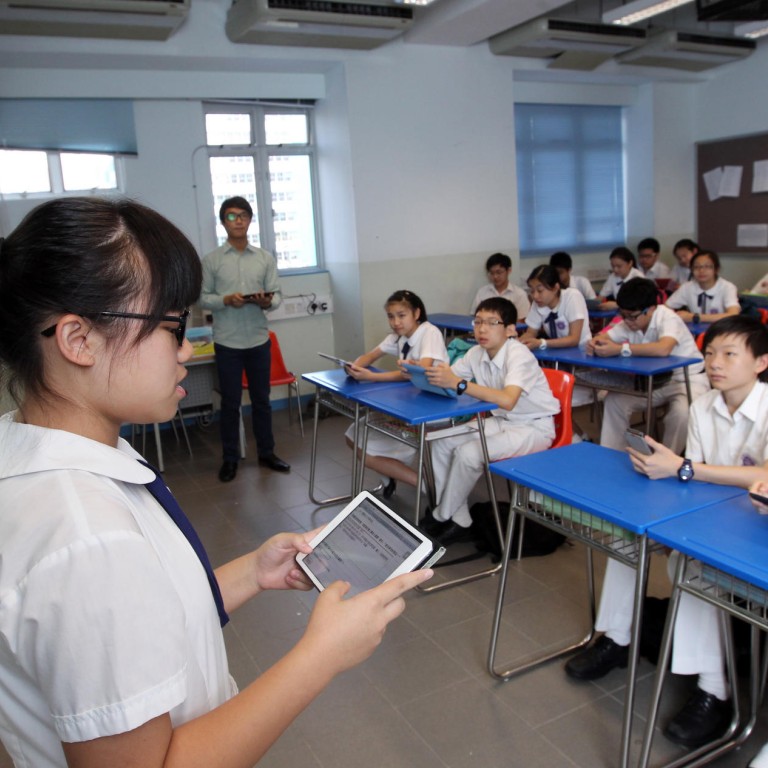
Tablets help Hong Kong students learn
A middle school is blazing a trail in e-learning to create a more dynamic teaching environment, write Linda Yeung and Richard James Havis
It's morning assembly, and Form One students at Pui Ching Middle School, have their iPads ready. It's the same story in their English and Chinese classes. As they listen to the news, read poems or watch other media on the screens in front of them, the students are preparing to put forward their thoughts via projector linked to their devices.
They are a pioneering group in a school already at the forefront of e-learning. From this autumn, the use of iPads will be rolled out to Form Two and Form Four classes. The school already has its own online learning system with various teaching materials and activities, and its students chat with one another on Facebook or the online course management system Moodle.
But it could take a while before Hong Kong schools use e-books extensively. That is despite the government initiative launched in November, which encourages 30 publishers to digitise their textbooks. The E-Textbook Market Development Scheme, which involves 88 schools testing the e-books under a Partner Schools Scheme, is spending HK$26 million for publishers to produce about 30 e-textbooks, which are expected to be available for use in the 2014-15 school year.
The government claims e-textbooks should be cheaper, giving the example of a geography e-textbook that was 63 per cent cheaper than its paper counterpart.
But Pui Ching declined to join the scheme. Instead, it is focusing on its own online learning platform. "We don't buy the idea of merely changing textbooks into a PDF format; we want students to input ideas and join in discussions via tablet computers. Teachers can also give feedback and assess their works online," says IT co-ordinator Ma Hoi-hung.
The school is keen to engage students in their learning and promote peer collaborations. "We don't want them to be passive learners; using tablet computers allows them to think, write and express their views and collaborate with other students more," Ma says. "The depth and breadth of discussion is also different. We project students' views onto the screen."
We don't want them to be passive learners; using tablet computers allows them to think, write and express their views and collaborate with other students more
Ma does not expect many schools to be extensively involved in online learning - yet. "E-learning is the trend at our school, but different schools have different cultures and student backgrounds."
Affordability may also be an issue. Pui Ching students buy their own iPads. At United Christian College, students share 30 iPads the school bought two years ago with a HK$1 million enhancement fund from the Education Bureau. The money was also spent on upgrading the school's Wi-fi server and generating online content. Students use the iPads for group research projects or to access the school's online learning management system in class.
"IT gives us convenient access to learning materials. Teachers can follow up easily on what students have produced or written, and even parents can track what their children have learned," says vice-principal Simon Lau Chun-wah, also a Chinese history teacher. "The iPads are better than laptops as they have apps and other uses, such as video recording."
His students also have access to about 200 books - mostly literature - in the school's e-library, as well as some e-books uploaded onto the school's virtual learning management system.
E-books also reduce the weight of school bags, doing away with the need to buy new editions. CourseSmart, a Silicon Valley company, offers software that allows teachers to see which pages of the e-book have been read by individual students. This lets teachers understand a student's studying habits, to help them tailor advice.
But Lau says schools are waiting to see "what will come out of the government's E-Textbook Market Development Scheme" before committing.
Educators note that e-versions of paper books are not always cheaper. Prices can be affected by development costs. "[Student] assessment methods usually need to be developed to go on the e-textbooks, and these usually consist of activities and tasks," says Victor Cheng Pat-leung, executive director of Hong Kong Education City, a government-owned electronic learning portal. "This requires software design and a platform to support the activities. This makes the e-textbook more expensive. It then becomes more than a book, as it can perform other services.
"A good e-textbook should have multimedia elements. Some teachers would also like the e-textbooks to have different levels of difficulty for different levels of students."
It will take time for publishers to develop products that make optimum use of the new tools available, instead of mere electronic transcriptions of hard-copy books. "If you just take a book and put it online as it is, it's not that different," says Daniel Churchill, associate professor and head of the division of information and technology studies at the University of Hong Kong.
"Much more attention needs to be given to highly interactive content and visual resources, which target the specific contents that students need to have for their education," says Churchill.
One problem is that although the Hong Kong government is allocating resources to e-learning, there's no guarantee that individual schools will sign up. "The shift [towards e-learning] has been very slow," Churchill says. The government puts the money and the resources into it, but the school principals have authority over how that money is spent, and very often it is diverted to other resources."
However, he believes the changes to electronic literature are necessary to keep pace with the evolving habits of young pupils.
"Students today all use Facebook and networking technology, so the way they learn and acquire information is very different to before," Churchill says. "They will not pay attention to the traditional content that has been used in the past. The relationship between society and technology has changed, and education has to keep up with that."
